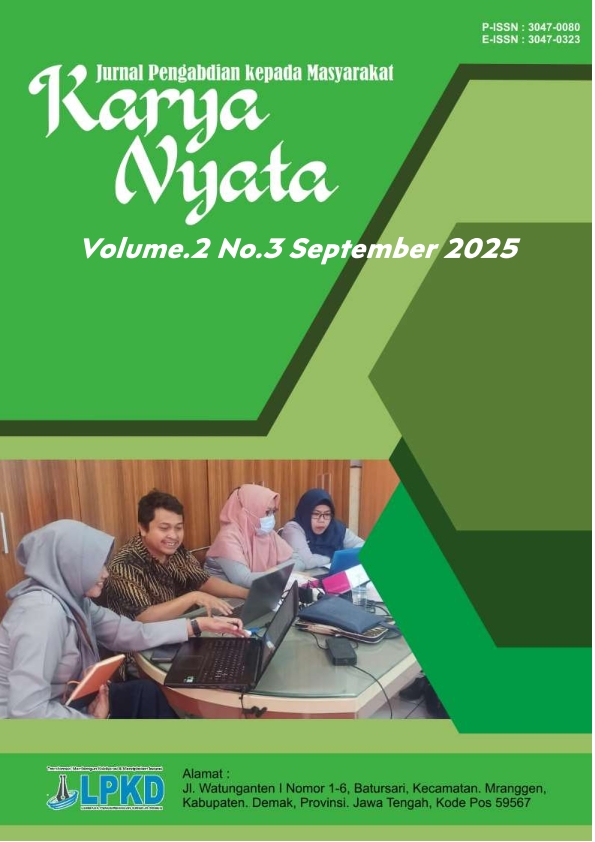Pelatihan Tools AI bagi Siswa SMK sebagai Upaya Peningkatan Kompetensi Digital dan Kesiapan Kerja
DOI:
https://doi.org/10.62951/karyanyata.v2i3.2069Keywords:
Artificial intelligence, Competencies, Literacy, Skills, ToolsAbstract
The digital competency gap between vocational school graduates and the rapidly evolving demands of modern industry has become a pressing issue in today’s workforce. One of the main challenges lies in the limited digital literacy and insufficient practical skills of students, particularly in applying Artificial Intelligence (AI) tools to support productivity and creativity. This situation hinders the readiness of graduates to compete in an AI-driven labor market, where innovation and technological adaptability are essential. To address this challenge, a training program was designed for vocational high school students at Darma Siswa Sidoarjo with the primary objective of enhancing both their conceptual understanding and practical competencies in the utilization of AI technologies. The program adopted the Participatory Action Research (PAR) method, emphasizing collaboration and active engagement between trainers and students. It was conducted through a series of interactive workshops that combined theoretical introductions with hands-on practice. Students were guided to explore AI-based platforms such as Ideogram for visual creativity, PixVerse for multimedia production, and Suno for AI-generated music. To evaluate the effectiveness of the program, pre-test and post-test instruments were used, focusing on the dimensions of knowledge, technical skills, and student confidence in using AI tools. The findings revealed that students initially demonstrated minimal awareness and limited practical ability in AI applications, as reflected in the pre-test results. However, post-test data showed a significant improvement not only in their technical proficiency but also in their enthusiasm to further explore AI technologies. Moreover, students gained increased confidence in producing creative outputs, transforming their role from passive consumers of digital tools into active and competent content creators. In conclusion, this participatory and practice-oriented training model effectively bridges the digital competency gap, enhances students’ job readiness, and fosters an innovative mindset.
References
Aldiansyah, P. M., Riyanto, D. Y., Richo, A. Y., & Erstiawan, M. S. (2025). Inovasi rompi medis untuk fisioterapis sepakbola berbasis tactical vest. CandraRupa: Journal of Art, Design, and Media, 4(1), 27–35.
Cakraningtyas, A. S., Alinta, I., & Susilo, B. (2025). Analisis tantangan integrasi kecerdasan buatan dalam pembelajaran sekolah dasar. Lentera Pengabdian, 3(01), 101–106. https://doi.org/10.59422/lp.v3i01.661
Candraningrat, J. W., & Erstiawan, M. (2021). Efektivitas strategi pemasaran dan manajemen keuangan pada UMKM roti. DIKEMAS, 5(1). https://doi.org/10.32486/jd.v5i1.574
Hakim, L. (2022, December 8). Peranan kecerdasan buatan (artificial intelligence) dalam pendidikan. Direktorat Jenderal Guru dan Tenaga Kependidikan Kementerian Pendidikan, Kebudayaan, Riset, dan Teknologi.
Hananto, V. R., Putra, I. G. N. A. W., & Erstiawan, M. S. (2020). Implementasi web portal komunitas gereja menggunakan metode crowdsourcing pada Gereja Santo Paulus Juanda. Society: Jurnal Pengabdian dan Pemberdayaan Masyarakat, 1(1), 70–77. https://doi.org/10.37802/society.v1i1.98
Morandín Ahuerma, F. (2023). Ten UNESCO recommendations on the ethics of artificial intelligence. https://doi.org/10.31219/osf.io/csyux
Nugroho, N. R. F., Insani, N. H., & Sukoyo, J. (2025). Pemanfaatan artificial intelligence (AI) dalam pembelajaran bahasa Jawa. Jurnal Onoma: Pendidikan, Bahasa, dan Sastra, 11(3), 3350–3365.
Nursalim, A., et al. (2024). Transformasi kurikulum di Indonesia: Perkembangan terkini dan tantangan dalam menghadapi era artificial intelligence. Innovative: Journal of Social Science Research, 4(4), 8482–8491.
Organisation for Economic Co-operation and Development. (2025). Artificial intelligence. OECD.
Pirmansah, I. A., Satria, D. A., & Musthofa, R. A. (2025). Analisa strategis dalam proses generate image to video pada platform AI generatif untuk optimalisasi kualitas video. Journal of Information System Management (JOISM), 7(1), 87–93. https://doi.org/10.24076/joism.2025v7i1.2131
Putra, A. P., Akbar, S., Setyosari, P., & Praherdhiono, H. (2025). Analisis pemanfaatan artificial intelligence (AI) dalam pendidikan terhadap kualitas pembelajaran di sekolah dasar. Ilmu Pendidikan: Jurnal Kajian Teori dan Praktik Kependidikan, 9(2), 99–105.
Sagirani, T., Effendi, P. M., Erstiawan, M. S., Eko Wulandari, S. H., & Rahmawati, E. (2025). AI untuk siswa: Pendekatan experimental learning dalam pengenalan artificial intelligence di tingkat SMA. Jurnal Pengabdian Masyarakat (ABDIRA), 5(3), 1014–1025. https://doi.org/10.31004/abdira.v5i3.846
Sagirani, T., et al. (2024). Inovasi teknologi dalam pembelajaran adab dan akhlak melalui media komik Pixton sebagai solusi interaktif. UN PENMAS (Jurnal Pengabdian Masyarakat untuk Negeri), 4(2), 151–165.
Sagirani, T., Nugroho, L. E., Santosa, P. I., & Kumara, A. (2015). User experience model in the interaction between children with special educational needs and learning media. In 2015 2nd International Conference on Information Technology, Computer, and Electrical Engineering (ICITACEE) (pp. 72–75). IEEE. https://doi.org/10.1109/ICITACEE.2015.7437773
Slamet, S., & Sagirani, T. (2024). Peningkatan kesiapan kerja siswa SMK melalui pengembangan soft skills di SMKN 1 Sambeng Lamongan. Tekmulogi: Jurnal Pengabdian Masyarakat, 4(2), 79–90.
Solehudin, M., Hanifansyah, N., & Izzuddin, I. F. (2025). Enhancing Arabic listening and vocabulary acquisition through AI-powered music: A study on Suno AI. Arabiyat: Jurnal Pendidikan Bahasa Arab dan Kebahasaaraban, 11(2), 175–188. https://doi.org/10.15408/a.v11i2.41994
Van Norren, D. E. (2023). The ethics of artificial intelligence, UNESCO and the African Ubuntu perspective. Journal of Information, Communication and Ethics in Society, 21(1), 112–128. https://doi.org/10.1108/JICES-04-2022-0037
Winanjaya, R., & Suhendro, D. (2025). Peningkatan literasi teknologi melalui pengenalan artificial intelligence di SMK Swasta Al Washliyah 2 Perdagangan. Jurnal Warta Pengabdian Masyarakat Nusantara, 3(1), 8–16.
Wuryandari, A., Prasetyo, H. J., & Muryanto. (2025). Kolaborasi pendidikan vokasi dengan teknologi AI: Tren teknologi AI untuk meningkatkan kompetensi siswa SMK 2 Klaten. WIDHARMA: Jurnal Pengabdian Widya Dharma, 4(02), 95–100. https://doi.org/10.54840/widharma.v4i02.404
Yuriananta, R., & Asteria, P. V. (2024). Pelatihan pembuatan media pembelajaran berbantuan artificial intelligence (AI) untuk guru. Jurnal Gramaswara, 4(3), 274–285. https://doi.org/10.21776/ub.gramaswara.2024.004.03.07
Downloads
Published
How to Cite
Issue
Section
License
Copyright (c) 2025 Karya Nyata : Jurnal Pengabdian kepada Masyarakat

This work is licensed under a Creative Commons Attribution-ShareAlike 4.0 International License.





